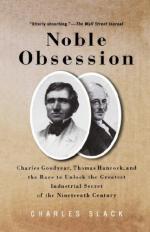|
This section contains 389 words (approx. 2 pages at 300 words per page) |
Encyclopedia of World Biography on Charles Goodyear
Charles Goodyear (1800-1860), American inventor, experimented with, perfected, and promoted the use of vulcanized rubber. He was instrumental in establishing the rubber industry in the United States.
Charles Goodyear was born on Dec. 29, 1800, in New Haven, Conn. He attended the local public schools. His father was an inventor, manufacturer, and merchant of hardware, especially of farm tools. When Charles was 17, his father sent him to Philadelphia to learn the business, and at 21 he returned to become his father's partner. He married at the age of 24 and 2 years later opened a store in Philadelphia. In 1830 a lifetime of financial distress began for the Goodyears when both father and son went bankrupt.
On a trip to New York City that year, Goodyear visited a store that sold goods made of india rubber, a product only recently manufactured in America. Inspired by the possibilities of the material, he determined to improve its usefulness. His first experiments were carried out in jail, where he had been sent for failure to pay his debts.
In 1837 Goodyear settled his family on the charity of friends near New Haven and went to New York to continue his work. He received a patent for an improved type of rubber and was able to find a modest amount of financial backing. After moving to Massachusetts, he met Nathaniel M. Hayward, an inventor, whose patent on a process for mixing sulfur with rubber he bought. Goodyear intended to combine the new patented process with his old one, which involved coating rubber with an acid and metal.
During an argument one day in his shop, Goodyear accidentally dropped a piece of the sulfur-impregnated rubber on a hot stove. Instead of melting, it merely charred slightly. Realizing the importance of this (two major drawbacks to using rubber were that it melted at high temperatures and tended to harden at low temperatures), he began experiments to discover the proper proportions and method of baking the new type of rubber, which he called "vulcanized." His critical patent was issued on June 15, 1844, after he had borrowed $50,000 for experiments, little of which was ever repaid. He claimed to have found more than 500 uses for rubber and received patents in all countries except England, where Thomas Hancock had invented vulcanization in 1843. When Goodyear died in 1860, he left his wife and six children $200,000 in debt.
|
This section contains 389 words (approx. 2 pages at 300 words per page) |


